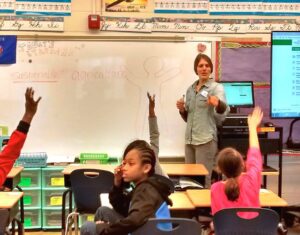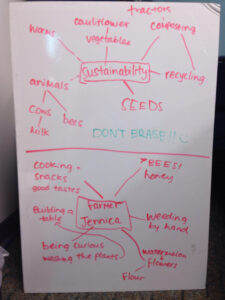2016 Annual Report for YENC16-100
Farmer in the Classroom: Introducing Elementary Students to Local Farmers and Sustainable Agricultural Practices
Summary
PROGRESS REPORT
North Central Region
Sustainable Agriculture Research and Education (SARE) Program
E-mail: emilyl@reapfoodgroup.org
Website: www.reapfoodgroup.org/farm-to-school
WORK ACTIVITIES
In August REAP onboarded four new Farm to School AmeriCorps members, including three nutrition educators who teach lessons in elementary school classrooms in Madison Metropolitan School District (MMSD) and one community outreach member who works directly with local farmers. In September, the nutrition educators began outreach to MMSD teachers to schedule the Farm to School lesson series in elementary classrooms. Additionally, the community outreach member began outreach to local farmers to participate in the final culminating sixth lesson for the Farmer in the Classroom program.
Starting in September, the AmeriCorps members and the Program Coordinator began developing lesson materials related to the concept of sustainable agriculture and examples of sustainable agriculture practices. We purchased the book Healthy Foods from Healthy Soils, a Hands-on Resource for Teachers and used the Toward a Sustainable Agriculture Curriculum developed by the Center for Integrated Agriculture Systems at the University of Wisconsin, Madison (www.cias.wisc.edu/curriculum/index.htm). Additionally, REAP has established lesson plans covering a wide variety of topics related to sustainable agriculture and these were utilized in the creation of the Farmer in the Classroom curriculum.
While the concept of sustainable agriculture is discussed in all of the Farmer in the Classroom lessons, the specific sustainable agriculture practices presented in a given lesson are determined through a joint planning process with the AmeriCorps members and the farmers. Each lesson also includes an introduction to the farm, why they decided to become a farmer, and farming as a career. The Program Coordinator created a tracking log to record the number of classrooms and students who participate in the program, the number of local farmers who visit schools, the concepts covered during the lessons, budget expenditures, and the number of community members reached through social media and other communications.
Thus far, the majority of grant funds have been spent on the Program Coordinator and AmeriCorps member’s time to facilitate the grant, including developing materials, outreach to farmers, and teaching lessons. The Healthy Foods from Healthy Soils book was purchased, but all other materials have been printed in-house. Farmer stipends constitute the remaining portion of the grant funds spent in 2016.
An example of a lesson plan taught in a third grade classroom is provided below:
|
ITEM |
CONTENT |
TIME |
MATERIALS |
|
Objectives |
Students will be able to: - Understand the key concepts of sustainable agriculture -Identify sustainable farming practices -Understand how sustainable ag. benefits: communities, farmers, the economy, and the environment -better understand beekeeping, importance of bees, and the process of making honey |
-Honey -Taste test sticks |
|
|
Agenda |
-Introduction to Sustainable Ag -Meet the Farmer/Know the Farm -Question and Answer -Snack Time - Surveys about sustainable ag. |
45 min |
|
|
Introduction |
Introduce the Lesson and Begin Class: Nutrition Educator -Introduce sustainable agriculture: Define, give examples. Reference reduce, reuse, recycle on farms. Limiting waste, creating materials from what would normally be considered waste on a farm. Introduce farmer and draw connection to lessons |
12 minutes |
|
|
Activity 1: Meet the Farmer, hear from her about her job |
Meet the Farmer/Beekeeper: -Talk about how you became a beekeeper -What is beekeeping? Share pictures/tools etc. -Talk about tools and processes used -Any beekeeping facts you would like to share -Why is beekeeping important to produce farmers? -Challenges and favorite things about beekeeping -Sustainability practices on farm |
15-20 |
flashdrive with photos any equipment, materials Karen brings with |
|
Goal: Students connect sustainability & beekeeping |
|||
|
Activity 2: |
Question and Answer For Students |
5-10 |
Talking stick |
|
Goal: Students get to have answered questions about beekeeping and sustainability |
|||
|
Activity 3: |
Questionnaire for students |
5-10 |
Questionnaires Pencil |
|
Goal: Students will have opportunity to record what they learned in the farmer visit today |
|||
|
Snack: |
Local Snack (procure and prep): Honey Taste Test |
5-10 |
Honey, coffee stir sticks for sampling. Map of Wisconsin |
|
Activity: Talk about importance of local honey, show where her farm is on a map |
|||
|
Conclusion/ Take Home messages: |
- eating foods that are produced locally by small farmers is important to support the people that live and work in our communities - bees are an important part of our local, regional, national, and global ecology for growing food - bees are very positive thing in the world for the free work they do. Yes, bees do sting when they are scared and threatened, but actually can be quite gentle as well. |

Farmer Jennica Skoug from the Goodman Youth Farm leads 5th grade students at Frank Allis Elementary School in a discussion of what a farmer looks like and what sustainable agriculture means.

Farmer Karen Nicholson teaches 3rd grade students at Lake View Elementary about the importance of bees to sustainable agriculture.

Third grade students at Lake View Elementary get to try out some beekeeping equipment with Farmer Karen Nicholson.

A completed ripple map in a 1st grade classroom illustrating what sustainability means to them and what they learned from Farmer Jennica.
RESULTS SO FAR
As of December 31st, 2016 the program has involved two local farmers in six classrooms, reaching over 90 students in three different elementary schools. The topics covered have ranged from beekeeping to cover cropping, the nutrient cycle in soil, composting, and food miles.
The anticipated impact of Farmer in the Classroom is an increase in Madison students’ knowledge of local farmers, farming as a career, and sustainable agricultural practices utilized by these farmers. In order to evaluate the impact of this program, a questionnaire is administered at the end of the Farmer in the Classroom lesson asking students “What does sustainable agriculture mean to me?” and “The most important thing I learned from Farmer [Name] is…”. This form was piloted in two 5th grade classrooms and the students struggled with understanding and answering the first question. The questionnaire was revised for future use, asking: “One thing I learned from Farmer [Name] is…?” and “An example of sustainable agriculture I learned today is…”. These questions are more concrete and allow students to showcase what they have learned from the farmer.
Examples of responses to the question “What does sustainable agriculture mean to me?” include: “sustainable agriculture means to me that you can reuse stuff”; “sustainable agriculture means to last a long time.”; “it means recycling leftover vegetables”; “to stay longer”; “I learned that sustainable agriculture means to recycle”.
Examples of responses to the question “The most important thing I learned from Farmer [Name] is…” include: “that bees only sting when feeled threatened”; “that using compost helps plants”; “they take out the seed from plants to save money”.
Examples of responses to the question “An example of sustainable agriculture I learned today is…” include: “nutrient cycle”; “reduce, reuse, recycle”; “reuse nutrients”.
It was also determined that these questions would be too complex for children in grades Kindergarten through first grade, so an alternate form of evaluation was utilized. This form is called ripple mapping and allows students to brainstorm as a group what they have learned and build off one another’s responses. This has proved to be a very effective method with younger children. A picture of a completed ripple map is included above.
Farmers also participate in a post-lesson survey in order for REAP to understand their perceptions of the program, interest in future participation, and suggestions for improvement. Two farmers have filled out the form so far and the responses have been overwhelmingly positive. Both rated students’ engagement in the lessons as a 4 out of 5 and their overall opinion of the program as a 4 out of 5. Both farmers are interested in participating in the program again and suggested using more hands-on activities as students really liked being introduced to the beekeeping props and preparing kale chips.
WORK PLAN FOR 2017
We have a total of 21 remaining classrooms scheduled for the Farmer in the Classroom program (for a total of 27 classrooms) and we are currently reaching out to schedule farmers for these lessons. Four new farmers are already scheduled in five of the 21 classrooms. There is also the possibility that additional lesson series will be scheduled, and if this occurs, we will bring Farmer in the Classroom to these students as well. AmeriCorps members will continue to work with farmers to develop lesson content pertaining to the sustainable agriculture practices utilized by individual farmers.
REAP is also beginning to plan our annual community-based Farm to School event, Family Food Fest, to be held in May 2017. Family Food Fest will provide REAP with the opportunity to introduce parents and the entire community to local farmers and highlight sustainable agriculture practices. Farmers will be invited to participate in the event by facilitating veggie tastings and discussing their farms. AmeriCorps members will facilitate educational activities about sustainable agricultural practices. To display what students have learned, AmeriCorps members will compile responses from the post-lesson questionnaires and combine them with pictures from the program to highlight the success of Farmer in the Classroom at Family Food Fest. We will begin working on the planning phase of this event in January 2017 and materials creation and outreach to farmers starting in March. The event will take place on Sunday, May 21st 2017 at Lincoln Elementary School in Madison, Wisconsin.
OUTREACH
In order to promote the program, an informational sheet about Farmer in the Classroom was created and shared with the Parent-Teacher Organizations at all 12 elementary schools where REAP provides Farm to School lessons. AmeriCorps members attended PTO meetings to discuss the lesson series and the Farmer in the Classroom program.
For each farmer who has participated in the program, we have made a Facebook post on REAP’s Farm to School Facebook page. The post about Farmer Jennica vising Allis Elementary School reached 284 people and the post about Farmer Karen at Lake View Elementary School reached 138 people. We will continue to post on Facebook about each farmer who participates in the program.
REAP will also highlight the program and multiple farmers through articles in our enewsletter (3,751 subscribers) and print newsletter (sent to 1,653 people).
Showcasing Farmer in the Classroom at Family Food Fest will allow REAP to reach hundreds of community members with information about the program, local farmers, and sustainable agriculture practices.